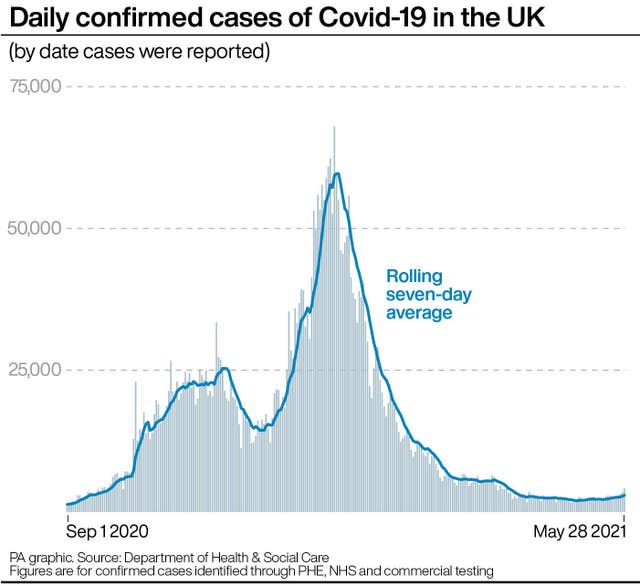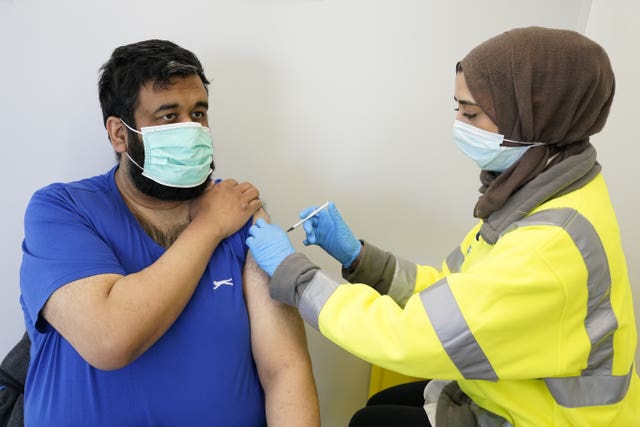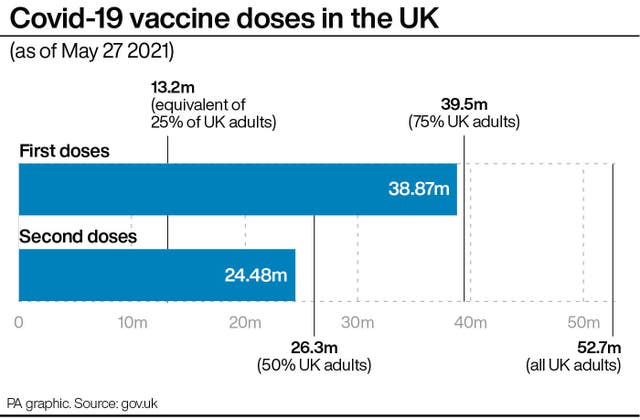‘Confusion’ over Government approach undermining Covid response, expert warns
Professor Stephen Reicher’s comments came as the spread of the Indian variant casts doubt on whether further restrictions can be lifted on June 21.

The “confusion” over the Government’s handling of Covid restrictions is undermining efforts to control the virus, an expert has warned.
Professor Stephen Reicher, a psychologist on the Sage sub-committee advising ministers on behavioural science, said the Government is in a “pickle” because it appears to have abandoned the “data not dates” principle.
His comments came as the spread of the Indian variant of coronavirus casts doubt on whether the planned lifting of all legal limits on social contact in England on June 21 will go ahead.
Experts have argued that restrictions should remain in place until more people have received both doses of a vaccine, amid reports that ministers are drawing up plans for a partial end of lockdown.
Speaking to BBC Radio 4’s Today programme on Saturday, Prof Reicher said: “I think we are in a pickle of the Government’s own making at the moment.
“I think the reason for that is it has departed from its own mantra of ‘data not dates’.
“Very quickly ‘data not dates’ became ‘dates not data’.
“People were promised that things would happen on particular dates and they invested so much in them, and the Government invested so much political capital in them, that it became very difficult to do anything else if the data suggested it was unwise.”
Current data suggests that, although hospital admissions are rising in some parts of the country affected by the Indian variant, overall admissions remain broadly flat.
Meanwhile, the reproduction number – the R value – for England is 1 to 1.1, up from 0.9 and 1.1 the previous week, suggesting the epidemic is growing.

Prof Reicher said: “The data we are seeing at the moment suggests we have a problem.
“We don’t know how big the problem is – it might be bad, it might be very bad, we will learn in the next week or two.
“But the problem for the Government is on the one hand it can’t delay what it has been promising for so long, but on the other hand it is aware of the dangers of so doing.
“And so you see that in the fact that they are beginning to act in a rather contradictory way.
“They’re saying to us, for instance, on travel, ‘You can travel internationally but please don’t’.
“They say of social contact ‘You can hug, but please don’t hug’. They say of restrictions ‘No restrictions but please don’t go in and out of the hotspots’.
“That contradiction, that sense of confusion, I think is undermining the response.”
He warned that it would be a “big blow” to the country’s recovery if a “third wave” was to force it “backwards”.
“I think it’s really important to take the data really seriously and act as strongly as we can to make sure that what at the moment is a potential crisis doesn’t turn into a real crisis,” he added.

Professor Anthony Harnden, deputy chairman of the Joint Committee on Vaccination and Immunisation (JCVI), also said data should be looked at “very carefully before we completely un-lockdown”.
He told BBC Breakfast it is “better” to be on “the cautious side”, adding: “Even if we do un-lockdown, if you are in a vulnerable position, particularly if you’ve not been vaccinated, you do need to carry on being cautious, even if the June 21 date goes ahead.”
He added: “I think we’ve all got used to living within boundaries at the moment and I think it’s not an ‘all or none’, I think it will be a gradual process, even if the June 21 date goes ahead.”
But Jonathan Neame, chief executive of the Shepherd Neame brewery and pub company, told the Today programme that delaying the easing of coronavirus restrictions in England beyond June 21 could hamper the economic recovery.
“If it’s delayed for, say, seven days but there’s still a certain outcome, the restrictions will be lifted in full after that, then that will be a marginal impact,” he said.
“If, on the other hand, we’re going into a cycle of a further five weeks of data review and uncertainty and more reviews at that time, then I think that will put a real damper on the recovery which is happening quite fast at this moment in time, and will really undermine consumer and business confidence.”

Prime Minister Boris Johnson told reporters on Thursday that he “didn’t see anything currently in the data” to divert from the June reopening target before adding: “But we may need to wait.”
The Times reported that face coverings and work from home guidance may remain in place after June 21.
It said ministers are increasingly concerned that the spread of the Indian variant could undermine the easing of restrictions and are drawing up plans that could lead to a partial end of lockdown.
But the paper added that the Treasury is prioritising the removal of the “one-metre plus” and “rule of six indoors” measures in order to help the economy recover.
A review of what measures will be relaxed on June 21 was due by the end of May but has been pushed back due to the Indian variant.
The Department of Health and Social Care announced on Friday that further surge testing is being deployed in Lancashire after more cases of the Indian variant were detected.
Public Health England data shows the majority of people with the variant have not been vaccinated, with just 3% of cases (177 out of 5,599) from February 1 to May 25 having received both doses.
Over the period there were 12 deaths linked to the variant, of which eight were among the unvaccinated.
The Government said that a further seven people had died within 28 days of testing positive for Covid-19 as of Saturday, bringing the UK total to 127,775.
Separate figures published by the Office for National Statistics show there have now been 153,000 deaths registered in the UK where Covid-19 was mentioned on the death certificate.
The Government also said that, as of 9am on Saturday, there had been a further 3,398 lab-confirmed cases in the UK.
Meanwhile, official data up to Friday shows that of the 63,960,762 jabs given in the UK so far, 39,068,346 were first doses – a rise of 197,146 on the previous day.
Some 24,892,416 were second doses, an increase of 414,364.





